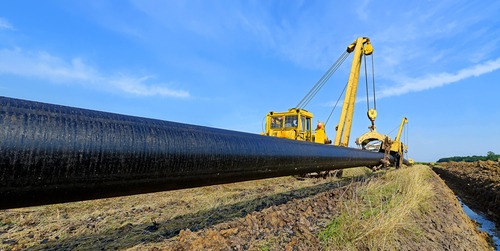
Lawyers for a $1 billion PennEast natural gas pipeline project will have the legal backing of the Biden administration when they head to the U.S. Supreme Court next month to overturn a 2019 lower-court ruling that has blocked its construction.
The U.S. Department of Justice (DOJ) added its opinion to a growing list of legal briefs weighing in on PennEast Pipelines, LLC’s case seeking to uphold its right to invoke eminent domain and to seize private land along the pipeline’s 116-mile route from Pennsylvania to New Jersey.
The DOJ brief filed earlier this month by Acting Solicitor General Elizabeth Prelogar, cited precedent dating to the Colonial period that allows the federal government to delegate the power of eminent domain to private parties carrying out essential projects.
“The right of eminent domain was well known at the Founding,” Prelogar said in the brief. “As the Court has long recognized, the Constitution conferred that authority on the federal government, including the authority to take State-owned land, for projects within the government’s enumerated powers.”
Prelogar’s brief largely followed the same contentions as a brief filed last year by the Trump Justice Department in support of PennEast.
In the PennEast case, the pipeline was acting under the authority of the Federal Energy Regulatory Commission (FERC) when it seized 42 parcels of state-owned land in New Jersey that were in the path of the project. The seizures were challenged by the state, and the U.S. District Court of Appeals for the Third Circuit ruled that PennEast’s use of eminent domain over the state’s objections violated New Jersey’s sovereign immunity, which is protected by the Constitution.
The move not only brought construction of PennEast to a halt, it also raised the prospect of similar objections sidetracking other interstate transmission projects.
“The case before the Supreme Court is about much more than a single pipeline project, which has already met and exceeded America’s stringent environmental regulations,” said David Holt, president of the Consumer Energy Alliance, which filed an amicus brief on behalf of PennEast last year. “It’s about the federal government’s power to regulate interstate commerce – the authority granted to it to stop the political motivations of a single state from interfering with the greater good of neighboring states and the country.”
It is not known when the High Court might rule following April’s arguments. PennEast has said previously that if it prevails, it can complete the project and begin shipping gas within a few years. The pipeline is designed to carry 1.1 billion cubic feet of gas per day from the Marcellus Shale gas fields to customers in Pennsylvania, New Jersey and New York.
“There are several factors potentially impacting the anticipated in-service date, such as approval from FERC on the phased approach, approval of the remaining permit applications from Pennsylvania regulators, and construction-related considerations,” Tony Cox, chair of the Board of Managers of the PennEast Pipeline Company, said in a statement last month. “At this time, we anticipate placing the Phase One facilities in service in 2022; and we anticipate placing the Phase Two facilities in service in 2024, though there may be a shift to the anticipated timeline depending on a number of factors.”